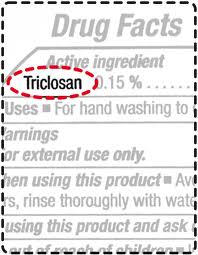More harmful effects from triclosan, a common antibacterial in hand soap
 In April 2012, I wrote about the ineffectiveness of triclosan, an antibacterial ingredient in many products we use every day–hand soaps, deodorants, mouthwashes, lipsticks, toothpaste, bedding, clothes, carpets, and even toys. A new study has shown that triclosan may be even more harmful than previously thought. Researchers at the University of California, Davis, and the University of Colorado have found that triclosan impairs muscle function. Mice showed “up to a 25-percent reduction in heart function” within 20 minutes of exposure to triclosan. One researcher said its effects, “like a potent cardiac depressant,” were “really dramatic.” In addition to the effects on the heart, the grip strength of the mice was reduced by 18% for almost an hour after only one dose of triclosan. The results surprised the researchers since even 10% reduction in muscle ability could affect an animal’s survival. Tests on fathead minnows, which were exposed to amounts of triclosan similar to what might be found in marine environments, found the exposed minnows were worse swimmers and were less effective in swimming maneuvers like those needed to evade predators than those minnows not exposed to triclosan.
In April 2012, I wrote about the ineffectiveness of triclosan, an antibacterial ingredient in many products we use every day–hand soaps, deodorants, mouthwashes, lipsticks, toothpaste, bedding, clothes, carpets, and even toys. A new study has shown that triclosan may be even more harmful than previously thought. Researchers at the University of California, Davis, and the University of Colorado have found that triclosan impairs muscle function. Mice showed “up to a 25-percent reduction in heart function” within 20 minutes of exposure to triclosan. One researcher said its effects, “like a potent cardiac depressant,” were “really dramatic.” In addition to the effects on the heart, the grip strength of the mice was reduced by 18% for almost an hour after only one dose of triclosan. The results surprised the researchers since even 10% reduction in muscle ability could affect an animal’s survival. Tests on fathead minnows, which were exposed to amounts of triclosan similar to what might be found in marine environments, found the exposed minnows were worse swimmers and were less effective in swimming maneuvers like those needed to evade predators than those minnows not exposed to triclosan.
The researchers don’t know how the study results could be translated to humans, but the “fact that effects were so striking in several animal models under different experimental conditions provides strong evidence that triclosan could have effects on animal and human health at current levels of exposure.” The researchers said that a special concern was the potential effect of triclosan exposure on patients with existing heart failure. The antibacterial chemical is so widely used, it would be difficult to determine its actual effect on patients.
Concerns about the safety of triclosan have prompted the FDA and EPA to conduct new risk assessments and may call for greater restrictions. The researchers in this study say the results “call for a dramatic reduction in its use.”
The FDA has found “other than use in some toothpastes to prevent gingivitis, there is no evidence that triclosan provides other health benefits or that antibacterial soaps and body washes are more effective than regular soap and water.”
Why should we wait for new restrictions? We know that triclosan has limited effectiveness and now we have further evidence of even more potentially serious side effects. Why not just stop using it?
For more information about triclosan and antibacterial soap, see my previous post, What’s best–antibacterial soap, hand sanitizer, or just plain soap and water?
Sources:
Triclosan–chemical widely used in antibacterial hand soaps–may impair muscle function: study
Triclosan, A Chemical Used in Antibacterial Soaps, is Found to Impair Muscle Function
Updated August 14, 2012:
Lipstick chemical alert: Ingredient in hundreds of household products ’causes heart problems’

Comments
More harmful effects from triclosan, a common antibacterial in hand soap — No Comments
HTML tags allowed in your comment: <a href="" title=""> <abbr title=""> <acronym title=""> <b> <blockquote cite=""> <cite> <code> <del datetime=""> <em> <i> <q cite=""> <s> <strike> <strong>